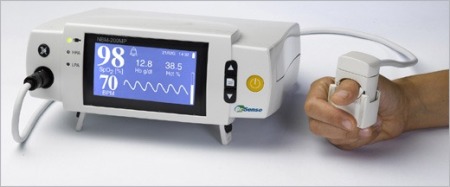A medical devices company specializing in non-invasive monitoring systems, OrSense presented details on the sensitivity and the accuracy of its NBM 200MP hemoglobin monitor at the annual meeting of the American Society of Anesthesiologists (ASA) held in Chicago.
By disclosing results of a study, OrSense announced that the non-invasive Hemoglobin measurement system, the NBM 200MP is capable of accurately detecting hemorrhage within a span of 4 mins. The monitoring device offers a high sensitivity of 96 %.

Hemorrhage can cause several complications and also in death. In developing economies, post-partum hemorrhage is linked to 25 % of maternal deaths and in industrial economies, to 8 % of pregnancy related deaths. For hospitalized patients receiving liquid infusions on a regular basis, a loss in the blood’s hemoglobin concentration accompanies blood loss due to the diluting affect the infusion solution has on the remaining blood. Approximately 90 % of trauma patients arrive in the ER with low hemoglobin levels.
The portable NBM 200MP is capable of monitoring blood loss and hemorrhage by measuring the hemoglobin level using a ring-shaped sensor. Once fitted on the patient’s finger, the device applies pressure and temporarily occludes local blood flow, during which the sensor’s optical elements use occlusion spectroscopy to measure the blood constituents. Another advantage of the non-invasive hemoglobin monitor is the ability to continuously monitor blood loss and quickly detect hemorrhage, which is often detected too late. The non-invasive measurement system also reduces pain and the risk of transmission of infectious diseases.
The Chief Executive Officer of OrSense, Lior Maayan stated that the results of the study, conducted on 12 volunteers in Milwaukee’s VA Medical Center, substantiates the potential of the device for easy to use and accurate monitoring of hemoglobin with minimal cost and effort. It greatly reduces hospitalization costs and complications.